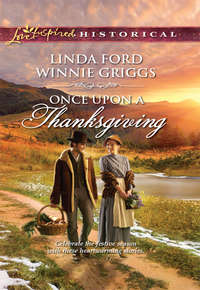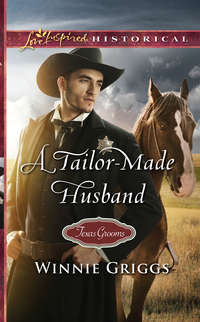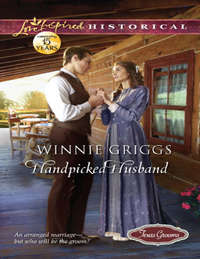
Полная версия
The Bride Next Door
“It appears you are a woman of many talents.” The sarcasm in his tone killed any chance that she would think he was paying her a compliment.
But she chose to ignore his lack of manners. Instead, she gave him her sunniest smile. “That’s kind of you to say. And you’ll see the proof of that when I open my restaurant.”
* * *
Everett realized he’d been harsher with his new neighbor than the situation warranted. But she’d apparently misread his tone. He glanced down at her offering of berries, and his conscience tweaked at him again. “Speaking of a job,” he said impulsively, “I can’t offer you anything full-time, but I do have a proposal for you.”
This time she leaned forward eagerly, apparently ready to forgive his earlier rudeness. “What did you have in mind?”
He was beginning to rethink his impulse, but it was too late to back out now. “Since you say you’re a good cook, what do you think about cooking for me?
“Really?”
Her hopeful expression brushed away the last of his hesitation. Besides, what could it hurt? “I’m the first to admit I’m not much of a cook myself, and I’m getting tired of the few dishes I’ve learned to prepare. I can’t pay you much, say two bits a day, but if you did the marketing and cooking for me, you could also share in the meal.” At least this way he wouldn’t have the distraction of worrying about her not having enough to eat.
She smiled at him as if he’d just handed her the keys to the town. Did that mean she’d forgotten his earlier rudeness?
“That’s more than generous,” she said. “And you won’t be sorry—cooking is something I’m good at. You’ll see.”
She folded her hands in her lap and struck what he supposed she thought of as a businesslike pose. “Just to make certain I understand what you’re wanting, are you looking for me to provide three meals a day, seven days a week?”
He waved a hand. “I believe I can get by with something a little less all-encompassing. I was thinking six days a week, with Sundays off. I’ll manage my own breakfast. And I’m not averse to eating the same thing twice, so if you prepare a large enough meal at noon, I can dine on leftovers for the evening meal.”
“That’s agreeable. When would you like me to start?”
“Is tomorrow too soon?”
“Not at all.” Then she fingered her collar. “Do you have much of a larder?”
“It would probably be best if you start from scratch and pick up anything you think you’ll need. I’ll leave the menus up to you. And I’ll let the shopkeepers know to put your orders on my tab.”
“Good. And don’t worry, I know how to be frugal with my purchases.”
A good quality, but he should make certain they were both working under the same definition of acceptable spending. “I will develop what I consider a reasonable budget for your weekly purchases. If there should arise a situation where you require more, we can always revisit the matter.”
“Agreed.” Apparently, she was finished with the businesswoman persona, because her face split into another of those delighted smiles. “Mr. Fulton, I’m beginning to think of you as my guardian angel.”
Now there was something he’d never been called before. And it was definitely not something he aspired to be.
“Not only is this job going to give me some security,” she continued, “but since you’ll only need me for part of the day, I’ll have time to find other odd jobs, as well.”
Other jobs? Did she even realize what she was saying? “That’s an admirably industrious attitude, but I imagine just getting your place in shape will take up most of your free time, at least for a while.”
She waved a hand as if that was of no consequence. “I’ll have to just fit that in when I can. Like I said, I need to earn some money, not just for staples, but to get my place furnished properly. Because the sooner I can open my restaurant, the better.”
She was back to that again. Oh, well, far be it from him to harp on a point once he’d made it. “If you’re serious about finding another job, as I said before, check down at Blakely’s Mercantile.”
“Thanks. I’ll do that.” She stood. “Now I’ll get out of your way. I know you’re busy, and I have some more work to do over at my place. Besides, I’ve made Kip wait on me long enough.”
Would the rest of her meals today consist of nothing more than a handful of berries? “I was thinking, Miss Johnson, that I might do an interview with you for the paper.”
“With me?” She seemed genuinely startled at the idea.
“It’s not every day someone new moves to town and sets up shop.” Although that’s exactly what he and his companions from Philadelphia had done less than a year ago.
He saw her hesitation and pressed further. “It would be doing me a favor. I’m always looking for something fresh to print in the paper.”
Her face puckered as she contemplated his words. Then she gave him a doubtful look. “If you really think it will help you...”
He jumped in, not giving her time to change her mind. “Wonderful. Let’s discuss this over supper tonight. The hotel has a small restaurant where we can go. And eating there has the added bonus of giving you an opportunity to check out your future competition.” Not that he truly expected her to ever open her own restaurant.
“All right, I’ll do it.”
“And of course it will be my treat, since I am imposing on you for this interview.”
She fingered her collar. “That’s not necessary. I—”
He schooled his features in his haughtiest expression. “I assure you, for a business meal such as this, it’s customary for the reporter to pay.”
She studied him as if not quite believing him. But he didn’t relax his expression, and she finally nodded.
“Good. I’ll stop by your place at six o’clock, and we can walk to the hotel together if that’s agreeable.” Even though he’d concocted the idea on the spur of the moment to see that she had a meal this evening, he was fully prepared to take advantage of the opportunity to practice his reporting skills. This wouldn’t be a very challenging interview subject, but at least it would give him something interesting to write about.
Then he gave her a severe look. “And please, leave your dog at home.”
Chapter Four
“So let’s start with where you’re from. Originally, I mean.”
Daisy shifted, uncomfortable with Mr. Fulton’s scrutiny and with having to talk about her background. She sat across from him in the hotel dining room, trying to decide if there was some polite way for her to get out of this. After all, she’d come to Turnabout to make a fresh start, not dredge up the past.
Still, he’d been kind to her, and this was the first thing he’d actually asked from her in return. Determined to focus on his kindness, she sat up straighter and smiled. “If you’re asking where I was born, it was in a little community called Bluewillow, Texas. I didn’t live there long, though.”
He scribbled a few strokes, then glanced up again. “Well, then, where did you grow up?”
“We traveled around a lot—Father was a peddler, even then. Most of the time, our wagon was our home. Then, when I was about four, my mother’s health began to go downhill, and traveling became difficult for her. So the two of us went to live with her mother while she tried to recuperate.”
“And where was that?”
“New Orleans.” Daisy brushed at the tablecloth, smoothing away a wrinkle. That wasn’t a part of her life she wanted to elaborate on. “Do you think the folks around here are really going to want to read about this stuff?”
His smile had a cynical twist to it. “I find that people everywhere have an infinite curiosity about the lives of others.” He poised his pencil over his pad again. “How much time did you spend in New Orleans?”
“Eight years.” Eight of the most smothering, uncomfortable years of her life. “Then I went back to traveling with my father.”
“Only you? What about your mother?”
Daisy nudged the lamp on the table about a quarter inch, not quite meeting his gaze. “She passed on when I was eight.”
“I’m sorry.”
There seemed to be genuine sympathy in his voice.
“Thank you,” she said. “Mother was a good person, you know, the kind who always tries to see the best in everyone. She was real pretty, too. Want to see?” Without waiting for his answer, she lifted the locket from beneath her bodice, then slipped the chain over her head. Opening the catch, she smiled at the picture, then handed it to Everett.
He studied the picture for a moment, his expression unreadable, then handed it back to her. “You’re right. She was quite lovely.”
Daisy carefully slipped the locket back over her head, feeling slightly disappointed at his lack of reaction. “What about you? I mean, I know you don’t have a locket, but do you have any kind of pictures or likenesses of your family?”
“No. Now let’s get back to the interview.”
She smothered a groan. If only the meal would come so they could end his string of uncomfortable questions.
“If I’m doing the calculations properly,” he continued, “it sounds as if you spent another four years with your grandmother after your mother passed on.”
“That’s right. Father thought it best to wait until I was older to resume traveling with him.” She tried not to dwell on that.
“Understandable.”
That pronouncement stung. It hadn’t been understandable to the grieving child she’d been. To her, it had felt like a second abandonment.
But Everett was already moving on to his next question. “Once you resumed traveling with your father, did you enjoy it?”
Daisy relaxed. This was a topic she was happy to talk about. “Very much. It gave me a chance to meet lots of wonderful people and to see places I’d never have seen otherwise. There are so many interesting folk out there, and they all have their own story to tell.”
“Stories? Now you sound like a reporter.”
She grinned. “Not at all. I’d be too fascinated listening to what they had to say, I’d forget to write anything down.”
His smile warmed for just a moment, then he seemed to come to himself, and he resumed his cynically amused expression. “If you enjoyed all that traveling, why did you decide to settle down?”
“Because I’m not twelve anymore.” She leaned forward. “Because I want friends and a family of my own and to be part of a close-knit community.”
“So why here?”
“Simple—because this is where there was a place that I owned the deed to.” She realized how flippant that sounded. “But I’m glad that was the case,” she added quickly. “Turnabout seems like a nice town with lots of friendly folk. A good place to put down roots.”
“You speak as if you plan to make Turnabout your permanent home.”
Hadn’t he heard anything she’d told him the past twenty-four hours? “I sincerely hope so.”
“You don’t think you’ll miss the traveling life?”
She understood why he’d ask that, but he’d learn eventually that she wasn’t that girl any longer. “Not at all. I’ve discovered I’m more of a homebody than I thought.” Assuming she found the right home. “The idea of setting down roots, creating a cozy homeplace, someday starting a family of my own—well, that kind of life has a whole lot of appeal to me.”
“Does that mean that after you went back on the road with your father, you found yourself missing the life you had with your grandmother?”
She gave a snort of disagreement before she could stop herself. He was so far off the mark, it was laughable. But his raised brow indicated she might have revealed a little more than she’d intended. “My grandmother’s home wasn’t exactly the warm, loving household that I’m hoping to build for myself.”
“Would you care to elaborate?”
She met his gaze without blinking. “No.”
“I see.” He stared at her a moment longer, as if trying to read answers in her face. Then he moved on. “Would you like to talk about the restaurant you hope to open someday? Or would you rather wait until you’re closer to making it a reality before spreading the news of your intentions?”
Daisy was surprised but pleased that he hadn’t pressed her. “Oh, I don’t mind. I want folks to know what they have to look forward to.” She leaned forward again, trying her best to communicate her vision. “I don’t intend to make it all fancy and highfalutin. I want folks to feel comfortable and happy when they walk in. I’m going to serve hearty, homey food that fills the belly and warms the soul, because that’s what I do best. And I’m going to paint the place in bright cheery colors and have flowers on all the tables.”
“That’s fine for this time of year, but it might be hard to do during the winter.”
That was just like him to look for gray clouds in a sunny sky. To her relief, the food arrived just then, saving her from further inquisition.
At least for the moment.
* * *
Everett set his pencil and pad aside as the waitress fussed with serving their food.
The interview so far had raised as many questions about her as it had answered. The way she’d described her planned restaurant was indicative of how little business sense she had. She’d focused on feelings and cosmetics instead of a sound plan to achieve her goals.
She’d said she was looking for, among other things, a family of her own. So that indicated she was looking for a husband. Which probably meant the restaurant idea was only something to get her by until she had a man to provide for her.
She hadn’t wanted to discuss her time at her grandmother’s, yet she hadn’t been happy traveling with her father, either. What was she really looking for? Did she even know herself? And would she be able to find it in Turnabout? Or would she only face disappointment and find herself moving on once again?
As soon as their waitress departed, and before he could resume his questions, Daisy beat him to the punch.
“So is it my turn for questions?” she asked with a teasing smile.
He raised a brow, not at all certain that would be a good idea. Better to treat her question lightly. “Are you planning to write an article for the paper, too? I thought you said you weren’t good at writing things down.”
“Don’t worry. I’m not looking to give you competition, just trying to satisfy my curiosity.” Her smile broadened. “You’re not afraid to get a taste of your own medicine, are you?”
He couldn’t let that veiled challenge pass. “What do you want to know?”
“How did a particular gent like you end up here in Turnabout?”
A particular gent? He wasn’t sure what that meant. And more important, had she intended it as a compliment or criticism?
Better not to ask. “Before I came here, I was a reporter for a newspaper in Philadelphia. Unfortunately, the editor and I had a falling out. When I learned of an opportunity to actually own my own newspaper business here, I jumped at it.” Mainly because that was the only option open to him at the time. There was nothing to be gained by mentioning the scandal he’d been involved in, the scandal that had cost him nearly everything. And deservedly so.
“So how’d you hear about this great opportunity? I mean, I wouldn’t think most folks in Philadelphia have even heard of Turnabout.”
Everett decided being on this end of an interview wasn’t nearly the same as being on the other. “A friend of mine has some connections here—a granddaughter, as a matter of fact. He knew I was looking for something different, and he told me about it.” He raised a brow. “Anything else?” he asked in his chilliest tone.
“Do all the folks in Philadelphia talk like you do?”
Was she being deliberately impertinent or merely trying to make conversation? “My accent, you mean?” She’d probably never heard a British accent before. “Actually, I lived in England until I was twelve.”
Her hands stilled, and her eyes widened. “Oh, my goodness. You crossed the ocean when you were twelve?”
That part of his life seemed a dream now. Or should he say a nightmare? He wondered if his father had ever given him another thought once he’d sent him and his mother away.
He smiled at her reaction. “I didn’t do it alone.” Then he locked his gaze with hers. “And no, I’m not going to discuss my life before arriving in America with you, so you may as well move on.”
She gave him an arch smile, or at least her version of one. “Keeping secrets of your own, are you? I guess we all have them.” She didn’t seem unduly bothered by his words. “So, moving on to another topic, what about family?”
Best to stick to the living. “I have a sister.”
Her expression softened. “I always wished I had a sister or brother. Is she older or younger than you?”
“Much younger. And before you ask, she’s attending a boarding school in Boston.” He pointedly stabbed a chunk of potato with his fork. He’d had enough. “Now, why don’t we put aside the interrogation and eat our meal before it gets cold.”
She held his gaze for a few moments, and he could almost see her trying to decide whether or not to push forward. She finally nodded, and they both turned their focus on their food without another word.
After several minutes Everett relented, but there was no more talk of a personal nature. “Have you had that dog of yours very long?” he asked.
Her stiffness eased, and her smile returned. Apparently he’d found a question she didn’t mind answering.
“No. As a matter of fact, we’re brand-new friends. I’d only been on the road to Turnabout for a couple of hours when Kip showed up and took to following me. I checked with folks at a couple of the farms I passed, and no one laid claim to him. Which was okay with me. He was friendly, and I was happy for the company.”
He imagined a woman traveling alone would be—especially at night. He still couldn’t believe her father hadn’t taken the time to escort her back here. The man should be horse whipped.
“He’s barely left my side since,” she added as she reached for her glass.
“And you plan to keep him?”
She seemed surprised by the question. “Of course. Like I said, we’re friends now. As long as Kip wants to stick around, he’s welcome to do so.”
Everett resisted the urge to shake his head. He could understand her wanting the animal’s companionship and protection while she was on the road. But now that she was settled in and trying to establish herself, couldn’t she see he would only be a drain on her limited resources?
But he’d said his piece. If she was an overly sentimental sort, then that was her problem.
The rest of the meal passed pleasantly enough. He was even forced to grudgingly admit, at least to himself, that Daisy could be a pleasant companion when she tried to be.
Later that evening, after he’d seen Daisy to her door and she’d promised to show up about nine o’clock the following morning since it was her first day, Everett returned to his own office.
He settled at his desk where he went to work transcribing his interview notes into an article. Tomorrow was Friday, one of the two days a week the paper went out. Tuesday was the other. That meant he had a long night ahead of him. Luckily, he’d already set aside space on the second page for his interview with Miss Johnson. He just had to craft his article so that it fit the allotted space.
As he wrote the article, he thought about what he’d learned from the sketchy details she’d given him. She was an optimist and a dreamer, that much was clear. And she wasn’t afraid of hard work. She had a certain amount of courage, too, as evidenced by her striking out on her own, on foot, with nothing but what she could carry to start her new life with. But did she really have it in her to stick with a project like this and see it all the way through?
He was certain there was more to the story of the time she’d spent with her grandmother than she’d been willing to tell him. That hint of a story to uncover intrigued him.
Then there was her idea of opening a restaurant. That was reaching a bit high, especially for a female with no experience running a business. To make a go of it, she would need more than optimism and elbow grease. She would need financial reserves and business acumen, neither of which he saw much evidence of in her.
No, it would be much more practical if Miss Johnson took on a permanent job as cook for some family in town who needed her more than he did. And once he was satisfied he could vouch for her expertise, he would be willing to give her a recommendation to help her find such a position.
That should fulfill his obligation to see her settled properly.
Perhaps then he could get back to life as usual.
* * *
Daisy settled onto her makeshift bed, tired but pleased with the recent turn of events. It had been a long day, but she’d gotten a lot accomplished. This storeroom that still served as her bedchamber was now clean as a rain-washed wildflower. She’d crafted a broom of her own and rigged up some of the broken crates and furnishings to serve as temporary tables and chairs. She’d traded the telling of her tale for a satisfying meal, and she’d landed herself a job without having to look too hard.
All in all, a good day.
Daisy rolled over on her side. She was still having trouble figuring out Mr. Fulton. He could be so nice at times, and at others...
Even when he was being nice, he had that snippy, amused air about him that was just downright irritating.
The snooty tone he’d used when he asked if she intended to keep Kip still irked her. What she should have told him was that if given the choice between Kip’s company and his, she’d likely pick Kip's.
I know that’s not a very charitable thought, Lord, especially since I have him to thank for my meal and my job, but something about that man just riles me up. I can’t abide a person who’s constantly looking for warts rather than dimples.
She thought about that for a moment, then winced at her ungrateful attitude.
That was a poor excuse for an excuse, wasn’t it, Lord? You tell us to judge not, and here I go judging again. And we both know I’ve got a wagonload of faults myself, so I’ve got no call to go throwing stones. I promise to try to do better in that regard. Just be patient with me if I slip again. And I’ll add him to my prayers. He obviously has some kind of bee in his bonnet, and he could use some help to learn how to look for the good things around him. Maybe he just needs someone to show him the way.
Feeling better, she settled down more snugly on her bedroll. Starting tomorrow, Mr. Fulton was going to be a part of her daily life and she a part of his. If this was her purpose for being here, then she aimed to tackle it with all the enthusiasm at her disposal.
Mr. Fulton was going to learn how to shed some of that stiff-necked, snobbish air of his, or her name wasn’t Daisy Eglantine Johnson.
Chapter Five
“Good morning, Mr. Fulton. You got those papers ready for me?” Jack Barr, Adam and Reggie’s adopted son, stood in the doorway of Everett’s office. Ira Peavy, the Barrs’ live-in handyman and sometimes photography assistant to Reggie, stood behind him.
Everett smiled a greeting at the pair. “That, I do. Your stack is the one closest to the door.”
Jack pulled a red wooden wagon into the building and started loading papers into the bed.
When he’d first opened the newspaper office, Everett had hired Jack to take care of making household deliveries to his regular subscribers. Of course, Ira Peavy usually went along, too, ostensibly to provide Jack with some company.
Everett exchanged greetings with Ira, then looked past the man to see the faint hint of the approaching dawn. He prided himself on having the paper available when his patrons started their day.
“You’ll find one extra paper in your stack,” he told Jack. “Mr. Cummings over on Second Street started subscribing this week.”
“Yes, sir, I’ll add him to the list.”
As they loaded the last of the papers, Everett reached into his pocket and pulled out a coin. “Here’s this week’s pay.”
Jack’s eyes lit up. “Thanks!”








